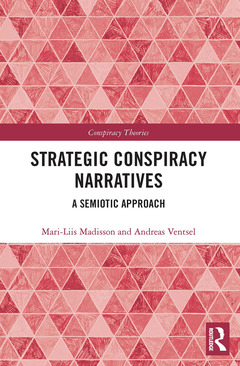Strategic Conspiracy Narratives A Semiotic Approach Conspiracy Theories Series

Strategic Conspiracy Narratives proposes an innovative semiotic perspective for analysing how contemporary conspiracy theories are used for shaping interpretation paths and identities of a targeted audience.
Conspiracy theories play a significant role in the viral spread of misinformation that has an impact on the formation of public opinion about certain topics. They allow the connecting of different events that have taken place in various times and places and involve several actors that seem incompatible to bystanders. This book focuses on strategic-function conspiracy narratives in the context of (social) media and information conflict. It explicates the strategic devices in how conspiracy theories can be used to evoke a hermeneutics of suspicion ? a permanent scepticism and questioning of so-called mainstream media channels and dominant public authorities, delegitimisation of political opponents, and the ongoing search for hidden clues and coverups. The success of strategic dissemination of conspiracy narratives depends on the cultural context, specifics of the targeted audience and the semiotic construction of the message. This book proposes an innovative semiotic perspective for analysing contemporary strategic communication. The authors develop a theoretical framework that is based on semiotics of culture, the notions of strategic narrative and transmedia storytelling.
This book is targeted to specialists and graduate students working on social theory, semiotics, journalism, strategic communication, social media and contemporary social problems in general.
Introduction PART I: Theoretical Framework Chapter 1: Semiotic conflicts in strategic communication Chapter 2: A semiotic approach to conspiracy theories PART II: Semiotic Analysis of Strategic Soros-themed Conspiracy Narratives Chapter 3: Strategic Soros-themed conspiracy narratives in politics, marketing and alternative knowledge Chapter 4: The main meaning-making mechanisms of strategic conspiracy narratives Chapter 5: Conclusion and future directions
Mari-Liis Madisson received her PhD in Semiotics and Culture Studies from the University of Tartu, Estonia in 2016. She is a Research Fellow at the Department of Semiotics at the University of Tartu and a visiting Research Fellow at School of History, Anthropology, Philosophy and Politics at the Queen's University Belfast, UK. Her research combines cultural semiotics, political semiotics, communication and media studies. Her research interests lie in online culture, conspiracy theories, information influence activities and extreme right communication. She is the author of The Semiotic Construction of Identities in Hypermedia Environments:The Analysis of Online Communication of the Estonian Extreme Right (2016).
Andreas Ventsel is a senior researcher of semiotics at Tartu University, Estonia. He holds an MA degree and a PhD in Semiotics. He teaches a range of subjects in semiotics, society and politics, cultural theory, and research seminars. His research is interdisciplinary, which includes semiotics, discourse theory, visual communication, rhetoric and political analysis with particular focus on post-structural political thought. Since 2007, Ventsel has participated in several research projects in the fields of semiotics, visual studies and strategic communication. He has presented the results of research on these topics in around 100 academic articles and has been the editor of several Estonian-based and international scientific journals. He is the author of Towards Semiotic Theory of Hegemony (2009) and Introducing Relational Political Analysis (co-authored with Peeter Selg, 2020).
Date de parution : 04-2022
15.6x23.4 cm
Date de parution : 09-2020
15.6x23.4 cm
Thème de Strategic Conspiracy Narratives :
Mots-clés :
Conspiracy Narratives; Strategic Narrative; Propaganda; Code Text; Social Media; Model Reader; Semitoics; Cultural Semiotics; Twitter; Transmedia Storytelling; Facebook; Model Author; Russia; Pop Stars; Deep State; Transmedia Narratives; contemporary strategic communication; Von Stackelberg; interpretation paths; Spreading Conspiracy Theories; strategic conspiracy; Semiotic Unit; semiotic perspective; semiotic construction; Information Conflicts; Affective Meaning Making; Phatic Function; Ordinary Scenario; CEU; Empirical Reader; Semantic Gaps; Conspiracy Culture; Van Prooijen; Phatic Communication; Cultural Marxist



